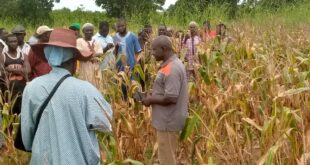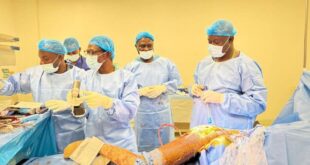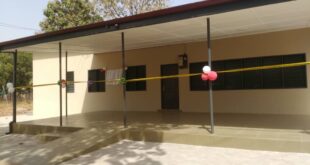AFRICA CENTRE FOR HEALTH POLICY RESEARCH AND ANALYSIS (ACH-PRA) was very much elated to hear Ghana’s Vice President, Dr. Mahamud Bawumia promised to introduce the use of trending technology (drones) in the delivery of health service in remote areas of Ghana. This is a clear indication that the Vice President (VP) and for that matter the government of Ghana understands the challenges of the health sector as faced by both health care givers and patients alike, especially in our remote communities. It thus reveals government’s acknowledgement of the low-quality of care being delivered to patients in these parts of the country. ACH-PRA therefore lauds government’s intention to help improve health care even in the remote areas of Ghana. However, the chosen mode of intervention (introduction of drones to improve upon the availability of blood and emergency drugs at remote health facilities) is not only unrealistic but also untenable as a remedy to the problem identified. This article therefore demonstrates this opinion.
The Drone Technology
Drones are Unmanned Aerial Vehicles (UAVs); in other words, aircraft without a human pilot aboard. There are various sizes of drones and the size to be
employed will depend on the role one wants it to perform. Drones have been successful in the transportation of chemical, hematology and microbiology samples for laboratory testing. As at the time of writing this article, the type of drones suited for transporting blood for transfusion have been in flux between research and development (R&D) and ascent. The maximum distance covered so far has been 20km within 26 minutes while flying at 100 meters above ground. This range throws a damper on any short-term prospects of using drones to deliver blood to remote health facilities in Ghana.
Another challenge facing researchers is how to maintain the temperature of the various blood components for a longer distance and time, bearing in mind that each blood component requires a different temperature for conservation.
There is also the conundrum of getting certified ground-based pilots to operate these drones. If we are thinking in terms of one pilot one district, we will need 254 pilots multiplied by 3 (i.e. 254 X 3 =726) to cover a 24-hours schedule and this is going to be a big hurdle to cross, if indeed government goes ahead to approve and purchase the drones. Our call is further strengthened early last month by the aviation minister who was in the news calling for urgent training of pilots to meet the growing industry demand, meaning the market premium for pilots is on the rise. Without any doubt in mind, no pilot will accept posting to the district to operate these drones for a less auspicious conditions of service.
Maintenance of Drones
Drones are not simple machines as we may think. They require a maintenance plan to keep them functioning. But taking lessons from the National Ambulance Service where 150 ambulances have been run down to 55 mainly because of poor maintenance, occasioned principally by
‘lack of funds’, one may imagine what will
happen to these drones. Very soon we will have redundant pilots just like we have redundant ambulance crew waiting for the next set of ambulances.
A Question of Priorities
Stroke, in other words Cerebrovascular Accidents (CVA), accounts for 9% of all deaths in Ghana and this is mainly due to hypertension. But, it is sad to note that most of our health facilities lack automated BP equipment to measure blood pressure. The same can be said about pulse oximeters, non-contact infrared thermometers and spirometers to measure vital signs. Common oxygen concentrators meant to provide enriched air for patients are hard to come by in some of our hospitals especially in these remote areas.
Ischemic Heart Disease (IHD) accounts for
8% of all mortalities and ranks 4th among causes of death in this country. However, some hospitals receiving emergency cases do not have basic diagnostic equipment to aid in rapid diagnosis and treatment. These basic equipment include electrocardiography (ECG) machines, hormonal machines for cardiac and clotting profiles. These equipment do not need specialized personnel to operate them. Meanwhile, their availability would save many lives.
Lower Respiratory Tract Infection (LRTI) accounts for 11% of all deaths in this country and ranks first in the list of causes of death. With the provision of simple equipment like pulse oximeters, mobile x- ray machines, hematology analyzers and incubators for culture, most of these deaths can be prevented. The mere fact that facilities cannot carry out sputum culture with drug sensitivity for prompt treatment means that we will continue to record such high, unacceptable figures of mortality through pneumonia.
HIV and AIDS accounts for 5% of all deaths and ranks 5th on the cause of death nationally. The fight against this deadly disease does not require sophisticated technology. In 2017, Ghana recorded a jump in new HIV infections by 70.15%; a very bad record for our country. Ghana currently has a well-established structure with time-tested coordinators to lead a campaign against HIV but funding has become a problem for them since 2017. ACH-PRA therefore urges government to focus on resourcing activities as mentioned above instead of fantasizing about impracticable drones for blood and drug transport.
Why Not Drones?
- Among the top ten causes of death in Ghana, hemorrhage does not form part; hence such a choice of intervention by government is not efficient.
-
Medical emergency is a coordinated activity and it’s capital intensive, hence a constructive planning will be key to helping the situation rather than an unsustainable measure such as drones to transport blood and drugs.
-
The cause of deaths in most rural areas is hardly due to lack of blood and emergency drugs. This is partly because at this level of the health structure, the CHPS Compounds and community clinics are not qualified to prescribe them. Their duty is to refer all acutely ill patients to district hospitals where these products are supposed to be stocked 24/7. Their duty is to refer, but where those good roads and ambulances are nonexistent the patients suffer the consequences. Basically, the purpose of the CHP compound (the health facility in most remote villages) is to carry out primary healthcare activities (preventive medicine); hence blood transfusion and administration of emergency medicine is out of the equation at that level.
-
To add to that, let us be reminded that we have levels of prescription in the various health facilities and this is done considering the caliber of professionals in each type of facility. These remote facilities are not allowed to prescribe drugs for resuscitation neither do they conduct transfusion of blood.
-
Data available rather indicates that most deaths due to lack of blood and essential emergency drugs occur at district, regional and teaching hospitals. It therefore suggests that road network is not a major hindrance to availability of blood and drugs at these facilities. Instead, issues like lack of a blood donation culture by citizens, lack of storage facilities and unstable power supply may be responsible for this shortage.
-
The ministry of health has two policies which when fully implemented, would go a long way to reduce these unwarranted mortalities government and citizens at large are worried about and as well as save Ghana from the drone adventure. We are talking about the: a). Referral Policy and Guidelines; and b). Policy and Guidelines for Hospital Accident and Emergency Services in Ghana.
-
A major bridge between the rural communities and the district hospitals is the bad nature of the roads linking to those communities. This is coupled with serious cases of inadequate/lack of resources and poor staffing to manage critical cases at the district hospitals. ACH-PRA believes fixing the roads will help a larger need beyond health care.
-
Do we not know that, Critical or essential drugs are not to be transported to hospitals when they are needed for use? Shouldn’t they be available at the facilities 24/7? (Reference to the second reason above which states which resources need to be available 24/7). These emergency drugs cannot be deferred. Because, the more you delay in administering them, the faster the patient draws closer to irreversible organ damage or death.
To ACH-PRA, the drone venture is quite a laughable one because it just cannot serve the purpose. The government of Ghana therefore needs a rethink through better alternatives that meet crucial priorities in the health sector. The health sector is one that does not require an ad-hoc knee-jerk solutions but well thought through decisions that can stand the test of time. It is the opinion of ACH-PRA that this policy should not be implemented because the health sector of Ghana needs a more realer and long -lasting intervention that won’t end up being a waste of resources. To the Government of Ghana and its Health Ministry, ACH-PRA would be glad if attempts are made to absorb unemployed trained health givers in the system to fill up gaps in the health care facilities of the nation. For example, the
617 bed Legon Hospital alone can provide employment to about 415 critical staff (90 doctors including specialists, about 300 nurses, 15 pharmacists, and 10 biomedical scientists) and this does not include auxiliary staff. In the abundance of water my people are thirsty.
In case of want of policies or projects featuring today’s technology for the health sector, ACH-PRA believes that a start- point of a simple computer software for bed management will be as good as a solution to the “developing no bed syndrome” in the country.
Otherwise, there are some outstanding projects in the health sector that have not been completed and commissioned but have dully been initiated with taxpayers’ hard-earned monies by the previous government. Government can consider completing and commissioning them for use.
By Africa Centre for Health Policy Research And Analysis (ACH-PRA), Tamale, Ghana.
 Savannah News Online Reporting Only What Matters Most
Savannah News Online Reporting Only What Matters Most



